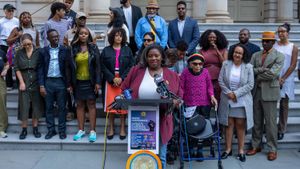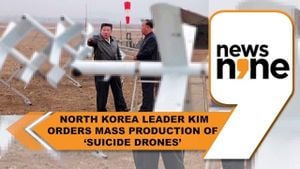Prime Minister Narendra Modi made headlines last week, engaging with both domestic and international audiences by emphasizing the importance of development over the divisive politics of the past. During his speech at the Hindustan Times Leadership Summit, marking its 100-year anniversary, Modi discussed how his government has prioritized the needs of all citizens, steering away from what he described as vote bank politics.
Modi pointed to tangible successes, such as the increased availability of LPG gas cylinders and the rise of digital transactions as proof of his administration's commitment to enhancing the dignity and self-respect of common people. "Earlier, having access to gas meant affluence. Today, we have connected millions of homes to LPG, doubling the connections from 14 to 30 crores since 2014," he showcased, underlining the transformative impact of these policies.
Significantly, Modi also touched on the current rise of startups across the country, emphasizing the potential of the youth. He remarked, "Today, there are over 1.25 lakh registered startups. When young people start taking risks, real change happens." His narrative around success stories not only paints India's economic advancements positively but also contrasts these with challenging times from the nation's past.
The Prime Minister didn’t shy away from addressing security concerns and socio-political transformations, recounting how previously troubled regions, like Jammu and Kashmir, now witness record participation in elections, drawing attention to the stabilizing political environment under his administration.
He also reminded the audience of the heavy toll from terrorism, saying, "There was a time when we felt insecure due to terror; today, terrorists don’t feel safe in their own houses". This reference to reduced terror threats serves to support his narrative of restorative governance throughout the tumultuous past years.
On the international front, Modi's recent trip to the United States was marked by attempts to strengthen bilateral ties and economic partnerships, showcasing India as a key player on the global stage. High-profile meetings with American business leaders and his participation at global forums highlight his administration's focus on securing India's economic future and technological advancements.
Simultaneously, Modi has strategically addressed his opponents, particularly the Congress party, which has faced criticism for its alleged return to old political games. Rahul Gandhi, Congress leader, criticized Modi by likening his memory erosion to US President Joe Biden, insinuations aimed at questioning Modi's governance and accountability.
While Modi continues to bolster his administration’s achievements as evidence of progress, it’s clear the political environment remains charged. His rhetoric highlighted contrasts between his government and previous administrations, advocating for policies aimed at inclusive growth and development without being tethered to past political divides.
Observing these developments can help decipher voter sentiment moving forward, especially as various state elections approach. Modi’s focus on infrastructure, technology, and economic expansion seems poised to resonate with the electorate as he frames these as core components of his vision for India's future.
At the conclusion of Modi's speech at the leadership summit, he expressed optimism about the potential of India, pointing out, "People reposed faith in us as we took steps to provide development with dignity." This sentiment encapsulates his push for restoring trust among citizens, presenting his administration as capable of not only governance but as integral to the growth narrative of India.
Looking closer at the immediate aftermath of the summit, Modi's speeches are expected to shape discussions within political circles leading up to the upcoming elections. His dual focus on both domestic issues and international partnerships reflects the broader strategy to project stability and growth, which might well be key to securing continued support from the electorate.
From enhancing infrastructure to fostering innovation among youths, Modi's current political narrative gains strength from successful projects his administration has initiated. The juxtaposition between the past and present underlines their drive against previous political complacency, effectively garnering attention from various international stakeholders wary of investment opportunities.
All these factors contribute to the narrative he aims to cultivate as elections loom large. By presenting his governance style as both inclusive and growth-oriented, Modi attempts to solidify his position as the preferred choice for leadership within the Indian political framework. The emphasis on development over divisive politics stands as both his narrative and appeal to the electorate, possibly reshaping how leadership is perceived among voters.



